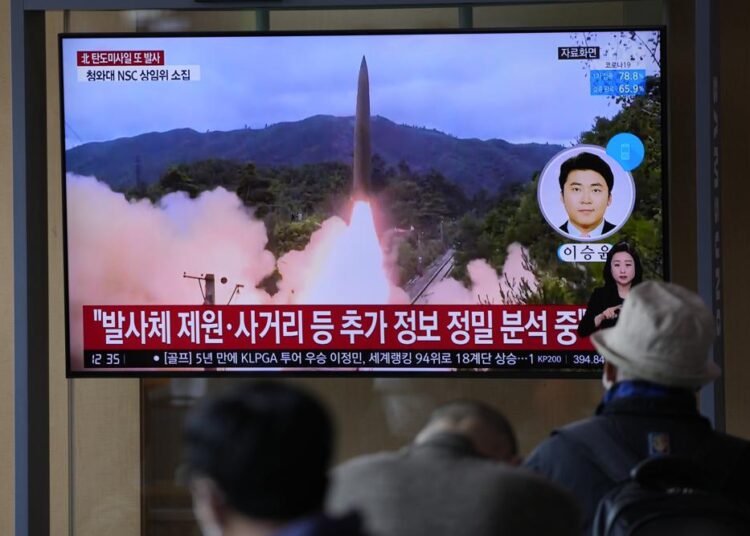SEOUL – North Korea fired a submarine-launched ballistic missile (SLBM) from off its east coast on Tuesday, South Korea’s military said, pulling Japan’s new prime minister off the campaign trail and overshadowing the opening of a major arms fair in Seoul.
The launch, reported by officials in South Korea and Japan, came after US and South Korean envoys met in Washington to discuss the nuclear standoff with North Korea on Monday.
The North Korean launch would be the latest weapons test by the country, which has pressed ahead with military development in the face of international sanctions imposed over its nuclear weapons and missile programmes.
The missile was launched about 10:17 a.m. local time from the sea in the vicinity of Sinpo, South Korea’s Joint Chiefs of Staff said, where North Korea keeps submarines as well as equipment for test firing SLBMs.
It was not immediately clear whether the missile was fired from a submarine or from a submersible test barge, as in most previous tests.
“Our military is closely monitoring the situation and maintaining readiness posture in close cooperation with the United States, to prepare for possible additional launches,” JCS said in a statement.
The missile flew about 430-450 kilometers to a maximum altitude of 60 kilometers, a military source said.
North Korea’s last SLBM test was in October 2019, when a Pukguksong-3 missile was fired from an underwater platform, flying 450 kilometers to a maximum altitude of 910 kilometers.
Kim Dong-yup, a former South Korea Navy officer who is a professor at Kyungnam University’s Far East Institute in Seoul, said the latest test likely involved one of the SLBMs recently unveiled by North Korea.
The Washington-based Nuclear Threat Initiative has assessed that “an operational (ballistic missile submarine) and SLBM capability could provide North Korea with additional options for nuclear launch, and a hedge against destruction of its land-based nuclear systems.”
International standoff
The US military’s Indo-Pacific Command condemned the launch as destabilising but assessed that it did not pose an immediate threat to the United States or its allies.
South Korea’s national security council held an emergency meeting and expressed “deep regret” over the test, urging the North to resume talks.
Japanese Prime Minister Fumio Kishida said that two ballistic missiles had been detected, and that it was “regrettable” that North Korea had conducted a string of missile tests in recent weeks.
Kishida cancelled scheduled campaign appearances in northern Japan, and the deputy chief cabinet secretary told reporters that Kishida was planning to return to Tokyo to deal with the missile situation.
The launch came as the intelligence chiefs of the United States, South Korea, and Japan were due to meet in Seoul to discuss the standoff with North Korea, amid other issues, Yonhap reported, citing a government source.
The U.S. special representative for North Korea, Sung Kim, said that he would visit Seoul for talks this week.
“The US continues to reach out to Pyongyang to restart dialogue,” Kim said after meeting with his South Korean counterpart in Washington on Monday. “We harbour no hostile intent towards (North Korea), and we are open to meeting with them without preconditions.”






Discussion about this post